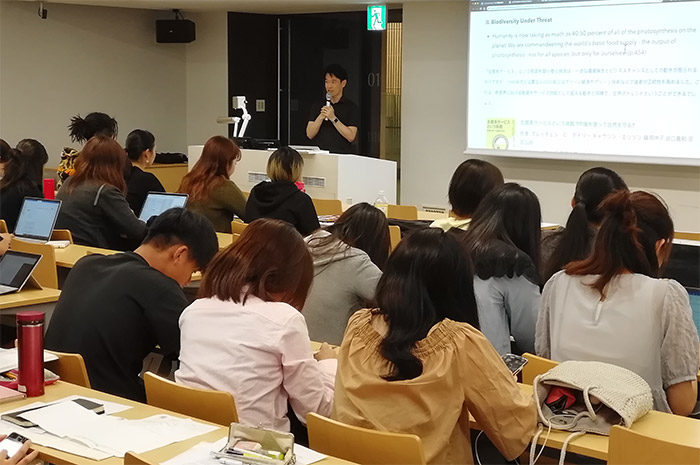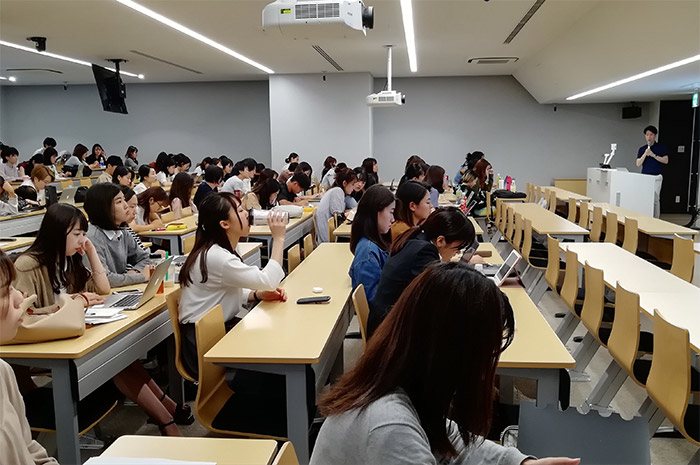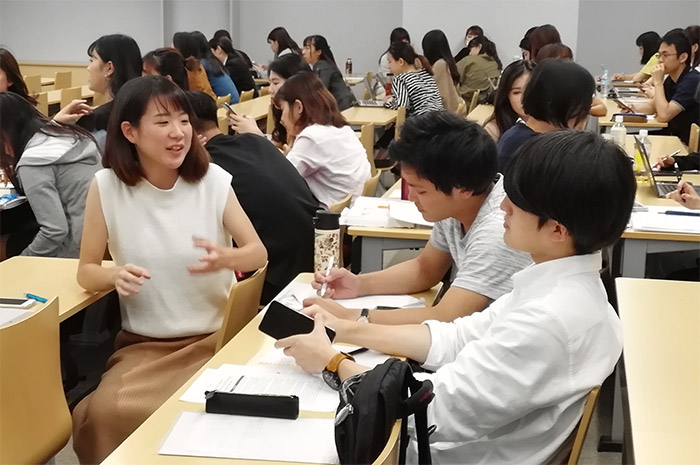Class Introduction:International Education Development Theory
What kind of subjects do FGS students usually take and what do they learn?
This time, we introduce the subject “International Education Development Theory” by Professor Hideki Maruyama.

Comment from Professor:
In “International Education Development Theory”, which consists of lectures and group work, students deal with international cooperation in the field of education and the improvement of education in so-called developing countries, and consider what is required for efforts to build a sustainable society. It has been about half a century since the concept of sustainable development became internationally shared, but it is also said that the world is approaching an unsustainable state. What is important in this discussion is the cross-cutting approach from traditional fields, the time span across generations, and the fairness and equity within the current generation. In the improvement of international cooperation and education development, the form has shifted from developed countries supporting developing countries to a stronger tendency
to collaborate toward solving various global issues. Today, not only international organizations and governments of developed countries, but also the participation of non-governmental organizations (NGOs), civic organizations, and private enterprises is important.
The main topic in this course is sustainable development and education. Ensuring educational opportunities for all people, including children in underprivileged environments, and providing appropriate educational content does not simply mean building schools, distributing textbooks, and having teachers teach as is the case in Japan. Even if children can go to school, barrier issues such as classes held in a language other than their mother tongue, family or regional constraints on study opportunities, or discrimination based on their background or gender can prevent them from advancing their education. While carefully dealing with this context, the course considers the impacts of globalization and envisages what choices are available to us. Therefore, students in groups will think about various aspects such as whether educational outcomes are being fairly assessed in addition to the quality of education (inputs and outputs), how education for girls and women not only relates to personal human development but also to societal development, and how to consider mutual supportability rather than charity from developed countries under the “Sustainable Development Goals (SDGs)” era which assumes social inclusion, economic equity, and environmental consideration, as well as what actions can be taken based on those thoughts.

Class Interview
What made me decide to take this course was participating in an internship at the Ministry of Education, Culture, Sports, Science and Technology (MEXT) in February of my sophomore year where I thought about the education required for a Japan advancing into an aging society with a declining birthrate. In Professor Maruyama's class, I was able to learn about the educational circumstances of various countries from multiple perspectives, which I felt was useful when thinking about issues related to education in Japan. I think the attraction of this course is that it incorporates a “flipped classroom” approach, which enables students to engage in high-quality discussions on their own initiative. In this class, students are required to prepare for the next lesson in advance by using teaching materials and videos at home. They should understand the key points and be aware of the issues related to the learning content before attending the class. In practical classes, after receiving feedback from the teacher, students take the lead and share their respective opinions on the given “questions”. Rather than just learning the content of the textbook, the students share their perspectives with one another, which further enhances understanding and allows for the presentation of opinions from multifaceted viewpoints. (Maya Yamaguchi, Third-year, Faculty of Global Studies)
I decided to take the course because I enrolled in the FGS out of my interest in international cooperation and support for developing countries. I took this course as an
extension of my previous interests. However, upon enrolling, I was surprised to find that the way I had imagined international cooperation was no longer applicable to the current world. I realized that “just providing the missing materials because there are no supplies there” is no longer a sufficient response. There is not just a single issue at play, but multiple issues that are intricately intertwined. Even when taking the example of school education, there are problems beyond education that cannot be solved by education alone. This course has touched on various issues such as education, health, poverty, and gender. These issues are interconnected; solving one problem doesn't mark the end of it. Now, various activities are being carried out around the world aiming towards the SDGs. It is important to always be conscious that each of these activities is connected. What is happening somewhere in the world is influencing everything else.
Another thing I felt while taking this course is that looking at world issues also offers new perspectives on Japan. International issues are linked to the things close to us, and what happens outside of Japan is not entirely unrelated to Japan. This course has offered me the opportunity to re-examine the world and Japan with a fresh perspective. (Chika Akagi, Third-year, Faculty of Global Studies)
This course, despite having more than 100 participants, allows each person to clearly express their thoughts during group discussions and other activities. The flipped classroom format means there is a lot of homework, but I look forward to the classes because what we study independently is deepened during the lessons. It is an advanced class that makes good use of ICT, with online tests and assignment submissions. Additionally, I initially thought sustainable development (SD) was a vast concept, but it is often approached from a local perspective in class, which is refreshing. (Yuka Tanaka , Third-year, Faculty of Global Studies)

